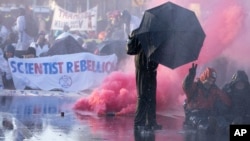Thousands of farmers and anti-establishment demonstrators protested Saturday in a park in The Hague against Dutch government plans to reduce nitrate emissions, while climate activists angry at what they call state support for the fossil fuel industry broke through police lines and blocked a major road elsewhere in the city for hours.
The simultaneous demonstrations a few kilometers from each other took place days before Dutch voters go to the polls in provincial elections. The elections Wednesday also indirectly select members of the national parliament’s upper house and could influence proposals for reducing nitrate pollution.
Late Saturday afternoon, police turned a water cannon on climate protesters who refused to leave the road they had occupied for hours, hindering traffic in and out of the city. Firefighters set up a tent nearby as a precaution to help doused protesters dry off and warm up, the municipality said.
Police said they stopped an unknown number of tractors that were headed for the farmers' demonstration. The city banned all but two “symbolic” tractors from participating, citing safety concerns.
Thousands of people, many carrying the upside-down Dutch flags that have become synonymous with farmers' protests and balloons emblazoned with the logo of the far-right Forum for Democracy party, gathered peacefully in front of a park stage for the demonstration. The two permitted tractors drove slowly across the park.
Bob De Jong, a farmer from the Dutch agricultural heartland of North Brabant province, said that if the current “corrupt” lawmakers remained in power “no farmer in Holland will survive.”
As the farmers gathered in the park in the south of the city, Mayor Jan van Zanen gave police permission to use a water cannon on Extinction Rebellion protesters who blocked a major highway in the downtown area near where it runs past the temporary home of the Dutch parliament.
Police said demonstrators who refused to leave the road would be detained. The highway was blocked in both directions, but police did not immediately use the water cannon. Several demonstrators lay down in front of the cannon, and another suspended herself off the side of a wall on one side of the road holding up a banner that read: “Power to the people.”
The twin demonstrations prompted authorities to place army trucks near some crossroads ready to block the streets if tractors or other protest vehicles tried to drive into the city center.
Anger at moves to cut nitrate emissions have spread from the Netherlands to other European nations. Just over a week ago, farmers drove hundreds of tractors into the heart of the Belgian capital, Brussels, snarling traffic.
At protests in recent years, farmers have driven hundreds of tractors into the center of The Hague and used them to blockade supermarket warehouses.
The government has said that nitrate emissions, which are produced by livestock, transport and industry, must be drastically reduced close to nature areas that are part of a network of protected habitats for endangered plants and wildlife stretching across the 27-nation European Union.
The government wants to cut emissions of pollutants, predominantly nitrates, by 50% nationwide by 2030. Ministers call the proposal an “unavoidable transition” that aims to improve air, land and water quality, and have warned that it will mean "that not all farmers can continue their business.”




